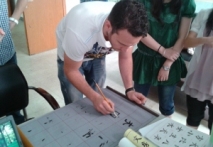Latest News
- Wuxi's Nanchang Street--a historic cultural district that combines classical charm, delicious food, and fun activities
- chinese study
- lastest courses
- Business Assistance/International Consortium of Stem Cell Research
- Foreigner's view of Jiangsu -Changzhou Jintan starts
- estimonials for Our new French Internship student Anais 企业表扬信
- The Double Seventh Festival in China Introduction
- Chinese Proficiency Test (HSK)
- China University Mining and Technology
- Wuxi Library
Students Say
Mandarin Student Zack
Mandarin Education School is a great place to learn Chinese and Chinese Culture.I've learned a lot in this school, my Chine...
Learn Chinese Travel China
If you want to learn Chinese and also discover China, Mandarin Education organize the most funny and cultural study tour.
The...
suzhou Mandarin Jude
I am Jude, I am learning Mandarin in Suzhou Mandarin School,I was learning in Wuxi Mandarin Education too.I like my Chinse Teacher...
chinese class
Improve your reading, speaking and your writing by experiencing our teaching methods,Offer free student Visa.
...
Wuxi Mandarin Jessie
I've learned Chinese for almost 8 years, I can understand what Chinese people say,but when I speak, I feel very uncomfor...
Chinese Internship or Jobs
You are looking for a professional experience abroad? Get the opportunity to discover the Chinese business,Look for an ...
Mandarinedu Student Florent
I love my Wuxi Mandarin Education School. It is the EASY MANDARIN Learning way, I am learning faster than I wanted.My teach...
Mandarin E Learning
Mandarin Education School offers you Online Chinese Courses. It has never been so easier to have Chinese courses ...
Mandarin Student Brad
I am studying Chinese in Mandarin Education School. I can speak quit good Chinese and talk to Chinese people by myself. Thank...
Wuxi Mandarin edu. Student Jennifer
I love learning Chinese in Mandarin Education School.That's a great place to learn and make friends.
...
Add Our School Official
to get more informations

0086 1866 1199 988
0086 510-81151808
Sandy.Swun
519988808
Mandarin Education School
Room 405, 4 Fl,Building No.8,
Maoye Business Center,
Chang jiang No.1,
New district , Wuxi City , China
How to Learn Mandarin Chinese Part 1
Many English speakers found that Mandarin Chinese is quite a complex language to learn. However, with commitment and daily practice it is certainly possible to successfully master. After 6 years of teaching Mandarin Chinese I have some suggestions on how best to learn this surprisingly easy language.
Part 1of 3: Mastering the Basics
The very first thing you should do is to spend at least a month just mastering the basic phonetics of Chinese language. I don’t think this can be over emphasized enough how important these early stages of pronunciation practice are. Because once you develop a bad pronunciation habit it will be very hard to break. You will be very glad you spent the time you did practicing the basic sounds of Mandarin.
It may of course be very boring in the beginning just rhyming off sounds like a parrot and not actually learning any words, but these are the basic building blocks of Mandarin Chinese so I hope you trust me when I say practice practice practice the basic sounds until you are blue in the face.
1. Learn Chinese Pinyin.
Pinyin is a phonetic system developed to help people to read and write Mandarin Chinese. Hanyu pinyin is the most common form of such Romanization, and is used in many textbooks and teaching materials. A pīnyīn syllable consists of an initial(consonant ) and a final( vowel and ending) with a tone.
•Pinyin allows students of Mandarin to focus on their pronunciation, while also enabling them to read and write, without needing to learn complex Chinese characters. Although Pinyin uses the Roman alphabet, the pronunciation of its letters is often not intuitive to English speakers, which is why it must be studied carefully before it can be used.
•For example, the letter "c" in Pinyin is pronounced like the "ts" in the word "bits", the letter "e" is pronounced like the "er" in the word "hers" and the letter "q" is pronounced like the "ch" in the word "cheap". Due to these differences, it is essential that you learn the correct Pinyin pronunciations before using it as a guide.
•Although learning Pinyin pronunciations may seem like a pain, it can be extremely beneficial to your language learning and is still significantly easier than learning to recognize traditional Chinese characters.
2. Practice using the four Mandarin tones.
Mandarin Chinese is a tonal language, which means that different tones can change the meaning of a word, even if the pronunciation and spelling are otherwise the same. It is absolutely essential to learn the different tones if you wish to speak Mandarin Chinese correctly. Mandarin Chinese has four main tones, as follows:
•The first tone is a high, flat tone. Your voice stays flat, with no rise or dip in the way it sounds. Using the word "ma" as an example, the first tone is indicated using the symbol above the letter a: "mā".
•The second tone is a rising tone. Your voice rises from a low to middle pitch, as if you were asking someone to repeat something by saying "huh?" or "what?" The second tone is indicated using the symbol "má".
•The third tone is a dipping tone.The pitch goes from middle to low to high, like when you say the letter "B". When two third tone syllables are near each other, the first one retains its third tone sound while the next takes the sound of the fourth tone. The third tone is indicated using the symbol "mǎ".
•The fourth tone is a lowering tone. The pitch goes rapidly from high to low, as if giving a command e.g. stop! Or as if you're reading a book and have come across something new and interesting and are saying "huh". The fourth tone is indicated using the symbol "mà".
•Easy enough? If not, don't fret. It's definitely recommended to hear the tones demonstrated by a native speaker, since it's hard to get an idea of what they sound like purely through text.
To be continued•••










